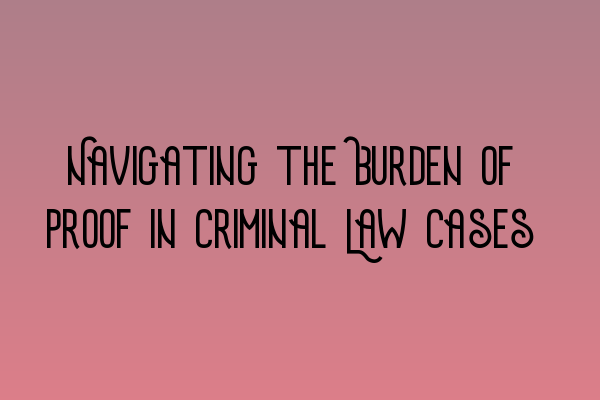Navigating the Burden of Proof in Criminal Law Cases
When it comes to criminal law cases, understanding the burden of proof is crucial. As a solicitor, it is important to guide your clients through this complex process and ensure they have a strong defense. In this article, we will explore what the burden of proof is and how to navigate it effectively.
What is the Burden of Proof?
In criminal law cases, the burden of proof lies on the prosecution. This means that the prosecution must prove beyond a reasonable doubt that the defendant is guilty of the crime they are accused of. The burden of proof is set high to protect the rights of the accused and ensure that no innocent person is wrongfully convicted.
There are various standards of proof in criminal law cases, and it is important to understand each one:
- Beyond a reasonable doubt: This is the highest standard of proof in criminal law cases. It means that the evidence presented must be so convincing that there is no reasonable doubt in the minds of the jurors. It is a heavy burden on the prosecution to prove the guilt of the defendant to this standard.
- Clear and convincing evidence: This standard of proof is lower than beyond a reasonable doubt but higher than a preponderance of the evidence. It requires that the evidence presented is highly probable and leaves little doubt in the minds of the jurors.
- Preponderance of the evidence: This is the lowest standard of proof and is typically used in civil cases. It requires that the evidence presented shows it is more likely than not that the defendant is guilty.
Understanding the burden of proof and the standard that applies to a particular case is crucial for both the prosecution and the defense. As a solicitor, it is your responsibility to ensure that the burden of proof is properly met and that your client’s rights are protected.
Navigating the Burden of Proof
When navigating the burden of proof in criminal law cases, there are several key strategies to consider:
- Gather strong evidence: To meet the burden of proof, it is essential to gather strong evidence in support of your client’s defense. This may include witness testimonies, expert opinions, or physical evidence. The more compelling the evidence, the stronger the defense.
- Challenge the prosecution’s evidence: As a solicitor, it is crucial to carefully analyze the prosecution’s evidence and identify any weaknesses or inconsistencies. By challenging the evidence presented, you can cast doubt on the prosecution’s case and weaken their burden of proof.
- Cross-examine witnesses: Cross-examining witnesses is an effective way to challenge their credibility and poke holes in their testimony. By asking strategic questions, you can uncover inconsistencies or biases that may undermine the prosecution’s case.
- Present alternative theories: Another strategy is to present alternative theories of the crime that cast doubt on your client’s guilt. By providing a plausible alternative explanation, you can create reasonable doubt in the minds of the jurors.
By implementing these strategies, you can effectively navigate the burden of proof and increase the chances of a favorable outcome for your client.
In conclusion, understanding the burden of proof in criminal law cases is essential for solicitors. By gathering strong evidence, challenging the prosecution’s case, cross-examining witnesses, and presenting alternative theories, you can effectively navigate the burden of proof and secure a favorable outcome for your clients. Stay up-to-date with the latest legal practices and explore the related articles mentioned above for further insights.
